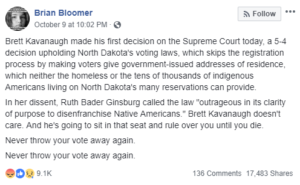via overlawyered:
How efficient is social media in spreading viral-junk misinformation about the law? Well, the following post about Tuesday’s two-page Supreme Court ruling in Brakebill v. Jaeger, a case about voting procedures in North Dakota, has gotten more than 18,000 shares as of this morning:
Let’s take a look at its errors, or at least the first four biggies:1. Brakebill was not Justice Kavanaugh’s first ruling. If you so much as glance at the Court’s opinion, it’s hard to miss its second sentence: “JUSTICE KAVANAUGH took no part in the consideration or decision of this application.”
2. There is no indication that the vote was 5 to 4. Liberal Justices Sonia Sotomayor and Stephen Breyer did not join the dissent.*
3. Justice Ginsburg’s dissent contains no language even remotely like that put within quotation marks here. Her tone is technical rather than indignant, and she does not challenge anyone’s motives as illegitimate.
4. The Court did not issue a decision upholding the laws. It was a denial of an application to vacate a stay, not a ruling on the merits.
Related: Social Media As Social Disease.
We don’t know much about the spread of ideas, or what would constitute the equivalent of intellectual indoor plumbing. But civics and skepticism would be a good start.
Society seems to be growing steadily crazier. And maybe it doesn’t just seem to be. Maybe it actually, isgrowing crazier.
I’ve been reading James C. Scott’s Against the Grain: A Deep History of the Earliest States, and one of the interesting aspects to the earliest civilizations is how fragile they were. A bunch of people and their animals would crowd together in a city, and diseases that weren’t much of a threat when everybody was spread out hunting and gathering would suddenly spread like wildfire and depopulate the town almost overnight.
As Scott writes, an early city was more like a refugee resettlement camp than a modern urban area. He observes that “the pioneers who created this historically novel ecology could not possibly have known the disease vectors they were inadvertently unleashing.”
